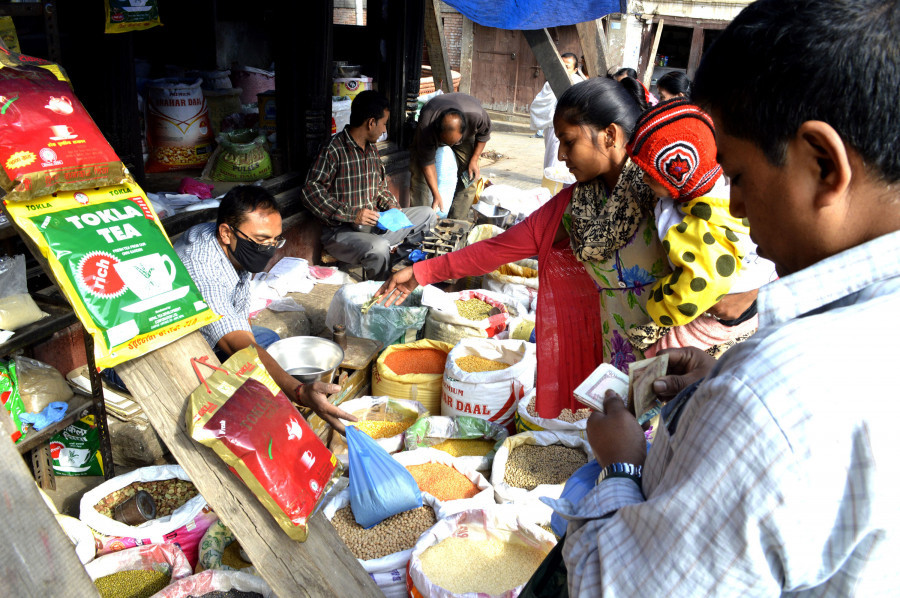Money
Rising fuel prices could lead to costlier food items, traders say
Nepal Oil Corporation has jacked up the price of diesel thrice in one month citing global trends.
Krishana Prasain
Food traders warned that costlier gasoline could lead to more expensive edibles after Nepal Oil Corporation jacked up the price of diesel thrice in one month.
The state-owned oil monopoly announced that global oil prices were headed upward, and that it would be no wonder if gasoline reaches Rs140 per litre in the domestic market.
Truck owners have responded by pressing the government to increase freight charges in line with fuel prices, raising concerns that food prices could jump again after dropping marginally in recent weeks following constant growth since mid-October.
On January 18, Nepal Oil had raised the price of diesel by Rs2 per litre to Rs93.
In February, the price was raised twice—Rs2 per litre each time on February 10 and February 17. Diesel now costs Rs97 per litre.
A rise in the price of fuel means that the cost of food items will go up accordingly, traders said.
Truckers have not increased their charges yet, but they have proposed to make adjustments as per the rise in fuel prices, said Sanjay Phuyal, a food wholesaler in Kathmandu.
“There are high chances that prices will be hiked within 10-15 days as truckers are piling pressure on the government,” he said. The rise in transportation costs will eventually be passed on to consumers, he added.
“There has been a slight increase in prices, but it is hardly noticeable because food costs had gone down in recent weeks. But the price of gasoline has been raised twice recently and truckers are likely to jack up their charges,” Phuyal said.
Consumer rights activists said that the government should become active to control any artificial hike in market prices on the pretext of costlier fuel so that they do not go up beyond reason.
“Nepal Oil Corporation has been saying that the price might reach Rs140 per litre considering international market trends, and that will impact supply management, prices and the overall market,” said Madhav Timalsina, president of the Consumer Rights Investigation Forum.
The government should have mechanisms to control prices, and it is unscientific to increase the price constantly on the pretext of international price hike, he added.
“Hiking the price is always not justifiable. The corporation collects taxes under unnecessary headings, and they first need to examine their inability to diversify business and utilise their existing funds,” he said.
Timalsina said that an increase in petrol and diesel prices will ultimately hit the price of essential food items, and this will provide an opportunity to unscrupulous traders to raise prices steeply and blame it on costlier fuel.
With fuel prices in uncertain territory, consumer rights activists warn that traders could begin hoarding goods to take advantage of a possible rise in prices, and that the government needs to step up strict inspection.
According to the Nepal Retailers Association, the price on rice has increased by Rs50 to Rs100 per bag in one year. Similarly, the price of lentils has increased by 10 percent while legumes, particularly dried green beans, have become dearer by 20 percent.
President of the association Raj Kumar Shrestha said that the market price of food items would not be affected immediately.
Consumers say they have not seen any drop in prices that traders have been talking about. “Food prices have not fallen as fast as they have risen,” Timalsina said.
Phuyal said that immediate effects have not been seen in the market as prices have decreased only slightly in recent weeks.
The prices of rice, edible oil and lentils have declined slightly in recent days as demand has slowed, Shrestha said.
With fuel prices increasingly monthly, grocery prices will certainly be affected, insiders said. In India, the price of petrol has hit an all-time high of IRs100 per litre.
The rise in fuel prices will have to be borne by consumers ultimately, making life hard for low- and middle-income people in particular.
Nepal Rastra Bank's six-monthly micro economic report shows the price of ghee and oil increased by 17.01 percent, vegetables and fruits by 16.58 percent, lentils and legumes by 11.48 percent and meat and fish by 11.48 percent during the period mid-December to mid-January, compared to the same period in the last fiscal year.




 22.12°C Kathmandu
22.12°C Kathmandu













